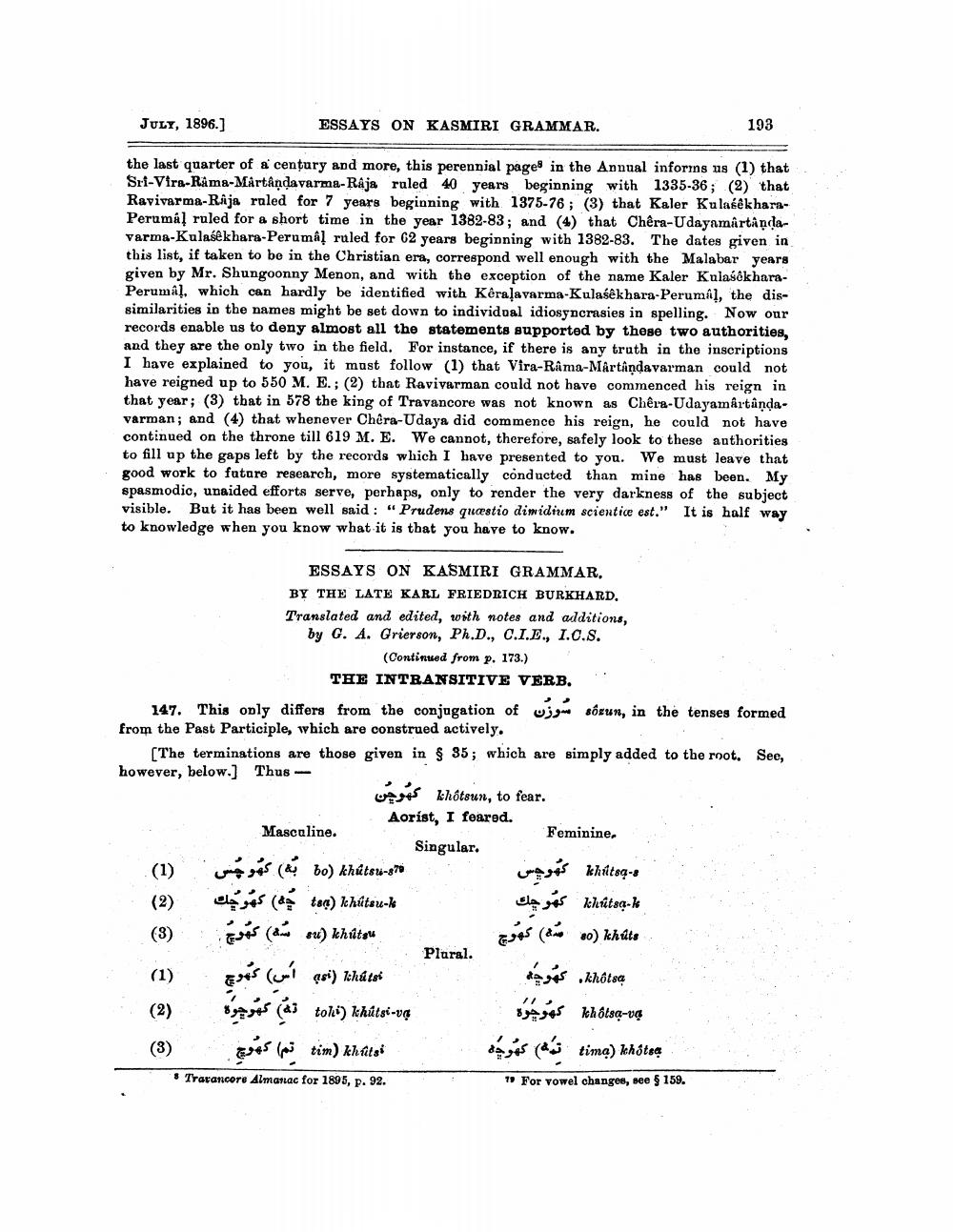________________
JULY, 1896.]
ESSAYS ON KASMIRI GRAMMAR.
193
the last quarter of a century and more, this perennial pages in the Annual inforins us (1) that Sri-Vira-Rama-Mártândavarma-Raja ruled 40 years beginning with 1335-36; (2) that Ravivarma-Raja ruled for 7 years beginning with 1375-76; (3) that Kaler KulaçêkharaPerumal ruled for a short time in the year 1382-83; and (4) that Chêra-Udayamartandavarma-Kulaśêkhara-Perumaļ ruled for 12 years beginning with 1382-83. The dates given in this list, if taken to be in the Christian era, correspond well enough with the Malabar years given by Mr. Shungoonny Menon, and with the exception of the name Kaler KulasokharaPerumal, which can hardly be identified with Keralavarma-Kulasekhara-Perumal, the dissimilarities in the names might be set down to individual idiosyncrasies in spelling. Now our records enable us to deny almost all the statements supported by these two authorities, and they are the only two in the field. For instance, if there is any truth in the inscriptions I have explained to you, it must follow (1) that Vira-Rama-Mártândavarman could not have reigned up to 550 M. E.; (2) that Ravivarman could not have commenced his reign in that year; (3) that in 578 the king of Travancore was not known as Chera-Udayamartandavarman; and (4) that whenever Chera-Udaya did commence his reign, he could not have continued on the throne till 619 M. E. We cannot, therefore, safely look to these anthorities to fill up the gaps left by the records which I have presented to you. We must leave that good work to future research, more systematically conducted than mine has been. My spasmodio, unaided efforts serve, perhaps, only to render the very darkness of the subject visible. But it has been well said : " Prudens quæstio dimidium scientice est." It is half way to knowledge when you know what it is that you have to know.
ESSAYS ON KASMIRI GRAMMAR. BY THE LATE KARL FRIEDRICH BURKHARD. Translated and edited, with notes and additions, by G. A. Grierson, Ph.D., C.I.E., I.O.S.
(Continued from p. 173.)
THE INTRANSITIVE VERB. 147. This only differs from the conjugation of wjy soeun, in the tenses formed from the Past Participle, which are construed actively.
[The terminations are those given in $ 35; which are simply added to the root. Seo, however, below.] Thus -
ways khótsun, to fear.
Aorist, I feared. Masculine.
Feminine Singular.
bo) khátsu-76 (2) Olje (
o tsa) lehútsu- (3) és (ao su) khitsu
EDAS (Oo oo) khúte
Plural. (1) Ex's (com qoi) leháteis
yes khôtse (2) spas já toli) kkütsi-vę
khôtsa-og (3) Boots i tim) khfitsi de jos (as tima) khótsą Travancore Almanac for 1895, p. 92.
1" For vowel changes, see $ 159.
-khateg كهرچس khateek كوچك




